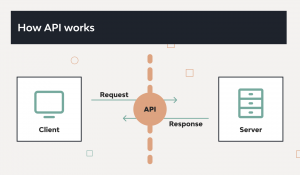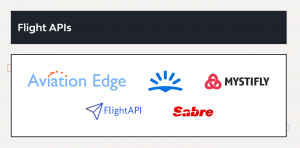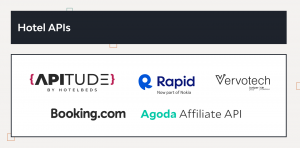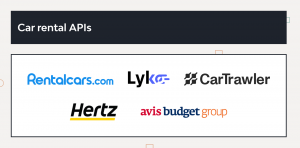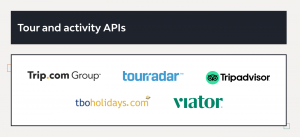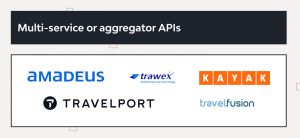25 Best Travel APIs: Types, Providers, and How to Choose

Today’s multi-purpose, versatile APIs help keep software open-ended and customizable without refactoring it. More importantly, as AI and the machine learning travel industry continue to evolve, these APIs enable digital service providers—such as travel and booking agencies—to deliver omnichannel and hyper-personalized user experiences.
Travel APIs can enable more targeted features for a tour operator’s system, a travel agency’s portal, or a booking services website, granting richer customer experiences. If you’ve been looking to enrich your travelers’ experience, this guide will help you pick a proven integration tool from the 25 best travel APIs.
What are travel APIs?
Travel APIs are Application Programming Interfaces used for websites and platforms dedicated to booking and tourism. For travel service providers, such APIs allow connecting external data flows and exchange this data in real-time. This helps personalize the services and scale without maintaining your own data repository.
Travel APIs allow software developers to integrate external travel data directly into their apps or platforms. This data can include flight schedules, tour options, car rental and hotel availability, and more. By feeding it via travel APIs, you can seamlessly expand a UX, enabling more search, comparison, and booking possibilities.
How do travel APIs work?
Travel APIs serve as connectors between your platform and external travel data providers. To set things in motion, the API uses web protocols to request and retrieve real-time information, e.g., on flights, hotel rooms, or car rentals. Once integrated with your system’s UI, the API can make multiple calls and process JSON/XML responses.
As such, travel APIs enable seamless data exchange for search, booking, or pricing of tours, flights, and other travel options. Whether retrieving availability or completing reservations, an API for travel helps ensure dynamic, synced interactions across digital services.
What are the benefits of integrating travel APIs?
Once connected to the site or application, a travel API opens a range of data flow sources and integrations. This brings a number of advantages, including:
- Real-time inventory and pricing — Travel API integration opens instant access to updated data on flights, vacant hotels, and car rentals, providing accurate rates and availability information for end users.
- User experience boost — Customizable travel APIs allow integrating search, comparison, and booking features within a single interface to easily and quickly enhance the UX.
- Time and cost efficiency — Travel APIs eliminate the need to build and maintain separate systems for each service, saving significant development time and costs.
- Broader reach and scalability — With a good travel API connected, you gain seamless access to global inventories, a range of categories of data, and travel content generated by the leading agencies and aggregators.
Best 25 travel APIs for 2026
Flight APIs
Aviation Edge API
Aviation Edge is a travel API that offers a rich repository of data — aggregated from a multitude of aviation partners and generated in real-time via live airborne flights tracking.
Pros:
- Global coverage
- Focus on the aviation and flight industry
- AI-powered recommendations
Cons:
- Subscriptions can be costly
- Potential hidden costs post-free trial
- Limited features documentation
Best for: Large platforms seeking to establish a range of data-driven flight booking (without necessarily managing their own database).
Skyscanner API
A global travel search engine and flight booking API that offers data for extensive booking and price comparisons across a wide range of airlines and online travel agencies.
Pros:
- Real-time flight fares
- Customizable filtered search
- Free to access and use
Cons:
- Request frequency restrictions
- Dependence on external data sources
- Integration complexity
Best for: Meta-search apps seeking competitive flight rates and companies in need of market analytics.
Mystifly API
A PaaS flight retailing platform that offers a unique travel API integration with lots of automation options, including refunds and cancellations, fees and rebates, and post-booking processing.
Pros:
- Automated void/refunds
- Integrated ticketing and fulfillment
- Next-gen airline retailing
Cons:
- May be complex or costly for small providers
- Possible feature overload
- Mystifly ecosystem dependence
Best for: B2B travel agencies that require comprehensive flight booking features and thorough automation.
FlightAPI.io
FlightAPI.io is a straightforward flight search API that can be integrated right from the official website for real-time booking price updates, airport metadata, and multi-vendor comparisons.
Pros:
- Data retrieval across carriers
- Quick and simple setup
- Revenue management dashboard
Cons:
- Basic feature set vs. GDS platforms
- Extra security demands (open API)
- Must be updated and maintaine
Best for: Developers who need lightweight, quick integration for instant use and scaling.
Sabre Flight API
Sabre is a GDS platform that offers a dedicated API for flights and itinerary management, booking, and analytics. This is one of the top travel API providers with flexible software suite options for airlines and travel agencies.
Pros:
- Ticketing, seat maps, and reporting
- Booking and reservation management
- Customizable UX
Cons:
- Commercial usage may cost extra
- Learning curve
- Possible vendor lock-in
Best for: Enterprise-level tour and booking aggregators or corporate travel companies.
Hotel APIs
Hotelbeds API
Hotelbeds has recently integrated a number of APIs for hotels, activities, and transfers into the APItude suite, offering hotel inventories across over 180,000 properties with real-time pricing.
Pros:
- Vast global coverage
- Dynamic pricing
- Suite of relevant APIs
Cons:
- Pricing details upon contact only
- Potential complexity of integration
- Consultation required before the choice
Best for: Businesses requiring extensive hotel coverage and additional features from the APItude suite.
Expedia Rapid API
The Rapid hotel booking API provides access to Expedia’s hotel database for search and booking, featuring a powerful engine that can be integrated for expansion and scaling, as well as full customization of lodging booking experiences.
Pros:
- Reviews and promotions
- An extensive inventory of hotels
- Scalability capacities
Cons:
- Auction-based inventory may vary
- Integration can be costly
- Limited to hotel bookings
Best for: Platforms seeking trusted hotel options and scalability potential offered only by the top-end travel API providers.
Vervotech Hotel Mapping API
Vervotech offers an in-depth travel booking API focused on AI-powered hotel data mapping and deduplication, which can be used to boost travel agency repositories through real-time updates and less service downtime.
Pros:
- Unified property data
- Standardized hotel content
- Content quality analysis
Cons:
- Enterprise pricing plans
- Large datasets can respond slower
- Possible integration challenges
Best for: Online travel agencies that need to handle multiple suppliers and accurately distribute hotel and room content data.
Booking.com API
The renowned Booking.com offers a separate hub for developers where it provides multiple pre-optimized travel APIs. The developers can use them to expand their real-time booking search with millions of listed properties.
Pros:
- Extensive inventory of properties
- In-depth reservation management
- Versatile APIs with documentation
Cons:
- No public API — access limited to partners
- Potentially complex integration
- Pre-integration consultation required
Best for: Online travel agencies running on content-rich platforms and ready for a mutual partnership with the provider.
Agoda Partner API
Agoda offers a set of partner-only hotel API integrations that are optimized for Asia-Pacific and mobile-first use. The suite includes a separate JSON search API, Content API, and CDS APIs..
Pros:
- Region-specific discounts
- Mobile conversion focus
- Diverse APIs with customizations
Cons:
- Limited regional reach
- Partnership-based access
- Can be complex to learn
Best for: Apps and providers that target APAC markets, need more mobile conversions, and are ready for partnerships.
Car rental APIs
Rentalcars.com API
The Rentalcars.com service provides a pre-registration API that can be integrated with your website or app to source car booking authentication data and automatically issue authorization tokens.
Pros:
- Data-driven pre-registration for car rentals
- User credentials validation
- Instant security reinforcement
Cons:
- May require additional approvals
- Limited in functionality
- Partner-only access
Best for: Consolidated travel platforms and services that want to automate authentication stages via modular integration.
Lyko API
Lyko provides a suite of tools with a travel API for developers looking to integrate data from global public transit networks, over three hundred shuttle, metro, bus, park, and ride operators across twenty European countries, to be exact.
Pros:
- Big database of public transit networks
- Transit routing across Europe
- Intermodal and multimodal trip planning
Cons:
- May require approval for integration
- Possible data overload for small providers
Best for: Consolidated travel platforms and medium-to-large providers in need of a versatile European public transit data stream.
CarTrawler API
CarTrawler provides developers with its Mobility API — a travel booking engine API offering a set of features for custom automation of car rental, tracking, and administration events and processes.
Pros:
- Extensive automation
- In-depth customization opportunities
- Assists laser-target personalization
Cons:
- Requires integration know-how
- Limited functionality
- Partner-based access
Best for: Enterprise car booking providers seeking extensions and additional B2B travel API functionality.
Hertz API
The Hertz API by Trawex is a suite of travel technology solutions, including custom production-ready modules, instant integration with suppliers, and BackOffice tools.
Pros:
- White-label travel API module
- Assisted itinerary planning
- Unique inventory management system
Cons:
- May require extra approvals
- Possible over-reliance on Hertz’s inventory and policies
Best for: B2C and B2B travel and booking providers looking for a fast and universal engine for scaling and white-label tech.
Avis Car Rental API
The Avis Budget Group offers some of the best travel APIs on the market as part of its Rental Cars suite, enabling access to an extensive rental car product catalog, locations, and reservations sourced by multiple data suppliers.
Pros:
- Powerful data supply by Avis, Budget, and Payless
- Comprehensive documentation
- Step-by-step “getting started” guide
Cons:
- Can be overly complex
- Limited in functionality
- Requires individual integration
Best for: Agencies and apps of any size looking to integrate extended car rental options and widen partnerships.
Tour and activity APIs
Trip.com API
Trip.com offers a Tours & Tickets Partner API — a suite of tools that allows suppliers to integrate automated tour and attraction bookings through standardized developer interfaces.
Pros:
- Multi-service inventory
- Custom travel portal integration
- Customer communication tools
Cons:
- Must join the Trip.com developers’ group
- Pre-integration consultation required
- Can be too much for smaller providers
Best for: All-in-one booking platforms seeking to expand their travel offerings with tours and attractions.
TourRadar API
TourRadar provides a unified adventure distribution and travel platform API, giving access to a massive database of multi-day organized adventures from over 2,500 operators.
Pros:
- 40K+ tours globally
- B2B, B2C, and B2B2C compatibility
- Affiliate, wholesale, and direct booking models
Cons:
- Focused solely on group adventures
- Unique API components need to be figured out
Best for: Marketing-focused tour operators and adventure marketplaces looking for more trusted operators worldwide.
TripAdvisor API
TripAdvisor provides travel software integration for developers through its Content API — once integrated, it retrieves traveler reviews and listings of experiences, providing fast testimonial and rating snippets for apps and websites.
Pros:
- Tons of user-generated content
- Activity listings for platform enrichment
- Covers millions of locations
Cons:
- Limited booking control
- API access for partners only
- Brand ecosystem dependency
Best for: Platforms and websites that aim to enhance experience pages with trusted user insights rather than full booking functionality.
TBO Holidays API
By integrating TBO Holidays’ XML/API for travel, you gain access to the massive database of content sourced from the inventories of hotels, tours, and activities across more than 300,000 registered properties.
Pros:
- Massive global coverage
- Flexible integration
- Bundled options
Cons:
- Access restrictions
- Can be complex to integrate
- Requires pre-integration consultation
Best for: Agencies or tourism portals planning to offer a comprehensive activity selection and cross-sell capabilities.
Viator API
Viator offers a partner-based travel deals API with flexible levels of access, frontend/backend integrations, and data for fully featured tours, activities, all excursions pulled up in real-time.
Pros:
- Local coverage and offers
- Four levels of access
- Technical guide and support
Cons:
- Partner-only access limitations
- Can be pricey for long-term use
- Can lack functional control
Best for: Apps and portals searching for a flexible online booking API focused on experiences and tours that come at a cost.
Multi-service or aggregator APIs
Amadeus Suite API
Amadeus provides a robust suite of third-party travel APIs that source data and content from ~400 airlines, ~150K hotels, and ~300K activities and tours, enabling seamless booking of flights, hotels, car rentals, and transfers.
Pros:
- Connects via self-service and enterprise API
- A Global Distribution System at the core
- On-demand status sourcing
Cons:
- Enterprise-grade features can be complex
- Access and licensing may be costly
- Requires tech planning and expertise
Best for: Large-scale travel platforms, online travel agencies, and travel management companies seeking a unified, scalable travel services backend.
Trawex API
Trawex is a multi-service travel API provider that offers a suite of services aggregating relevant data on flights, hotels, car rentals, tours, transfers, and sightseeing, all via both REST and XML integrations.
Pros:
- All-in-one offering from top provider
- Extensive inventory and REST data pipelines
- Global distribution tools
Cons:
- Needs direct onboarding
- Not a plug-and-play service
- Multi-domain integrations are complex
Best for: Travel agencies and platforms that require integrating multiple services through a single backend vendor.
Kayak API
Kayak Data Solutions aggregates vast amounts of data, sourcing it through a unique travel marketplace API that’s optimized for content strategy creation, pricing optimization, and competitor rates analysis.
Pros:
- Popular meta-search interface
- Aggregates data for comparisons
- Quick launch of search/comparison features
Cons:
- Selective integration
- Limited transparency
- Requires expertise and customization
Best for: Comparison and meta-search platforms that prioritize brand familiarity and broad provider coverage.
Travelport API
Travelport provides a suite of multi-purpose travel APIs that are pre-tuned to equip booking and tourism apps, websites, and platforms with convenient dashboards and rich toolsets delivered at an industry standard.
Pros:
- Established, reliable service
- A Global Distribution System approach
- Full booking lifecycle support
Cons:
- Implementation may be complex
- Less flexible than REST APIs
- May require GDS expertise
Best for: Full-service travel agencies, corporate platforms, or enterprise online travel hubs that need rich GDS-level functionality.
Travelfusion API
Travelfusion is a top-rated aggregator that provides instant access to low-cost carriers, full-service airlines, NDC content, and more, via a Direct Connect XML interface and two comprehensive APIs — the XML Flight API and Fast API.
Pros:
- Access to 400+ carriers
- Extensive management features
- Tools for supplier routing and reporting
Cons:
- XML may require legacy-style technical handling
- Onboarding is selective
- Potential complexity in error-handling
Best for: Online travel agencies, travel management companies, or metas that focus on airline diversity, particularly including low-cost and NDC content.
How to choose the best travel API for your app
The selection of proven APIs that can boost your services is quite wide — you should follow the most relevant criteria to pick the best. Make sure to pay attention to the following points.
- Service coverage
Make sure the API covers the services you intend to offer (flights, hotels, car rentals, or activities). - Real-time travel data quality
A reliable API offers only accurate, up-to-date information from trusted sources. - Ease of Integration
Select APIs that offer clear documentation, support, and readiness to assist and consult you. - Cost and licensing
Consider the pricing structure and licensing terms to fit your budget and partnership desires. - Security and compliance
An API must adhere to industry standards and regulations to protect user data.
Conclusion
Timely integration of an online travel agency API can enrich and scale your booking app or flight booking website like no other software refactoring effort. Thanks to proven providers and available tech, there is a good choice of APIs, with suites and separate solutions that should cover your data and functional needs.
If you need help choosing the best travel API or you look for a travel software development company to build new custom solutions, talk to professionals at Django Stars for an individual consultation and technological guidance.
